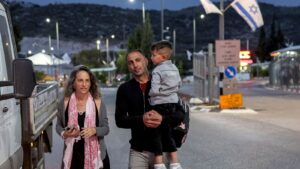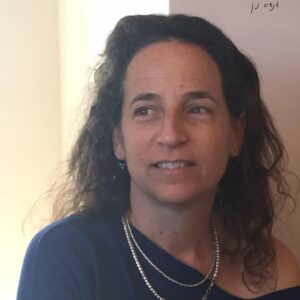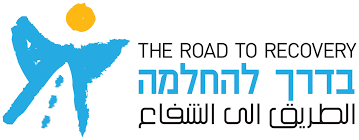KOLOT – Voices of Hope, Post-October 7 Series
The Road to Recovery: Humanizing the Israeli-Palestinian Conflict through Patient Transport
A Conversation with Yael Noy, CEO of The Road to Recovery
This interview, which took place prior to the recent Israel-Hamas ceasefire deal, has been edited for length and clarity.
Partners for Progressive Israel (PPI): Thanks for chatting with us, Ya’el. Could you tell us about The Road to Recovery?
Yael Noy (YN): We’re an Israeli association of volunteers who drive Palestinian patients from checkpoints in the West Bank to hospitals in Israel, and back again. In the past, we also did this with Gaza.
Most of the patients are children, and the patients in general need to meet a few criteria to enter Israel: Usually they require life-saving treatment that isn’t provided in the Palestinian Authority. That includes a lot of kids with oncological or nephrological issues because there’s no pediatric dialysis in the Palestinian Authority. And kids who need organ transplants or suffer from chronic, genetic illnesses that can’t be treated in the Palestinian Authority.
Officially we’ve been operating as a nonprofit since 2010. But the first request came 19 years ago.

PPI: How did that come about?
YN: The Road to Recovery was initiated by Yuval Roth. Yuval’s brother, Udi, was abducted and killed by Hamas in 1993 while returning home from reserve duty in Gaza; it was a month after the signing of the first Oslo Accord. Yuval subsequently joined the Israeli-Palestinian “Parents Circle – Bereaved Families Forum”.
One day in 2005, Yuval got a call from a Palestinian friend, Muhammed Kabeh, also a member of the Parents Circle group. Muhammed had a request: His brother was ill and had to be taken to the hospital. Of course, Yuval took Muhammed’s brother. After that, word spread through word of mouth, to family and neighbors, and more and more requests came in. That’s how it got started.
PPI: So, what happened in 2010?
YN: Leonard Cohen, the late singer-songwriter, heard about the work we were doing and wanted to make a donation. That spurred the creation of an official registered nonprofit.
I should mention that The Road to Recovery isn’t connected organizationally to the Parents Circle. Our founder is a member of the Forum, but the organizations are completely separate entities.
PPI: How many drivers are involved in The Road to Recovery?
YN: We actually don’t call them “drivers”. We refer to “volunteers” who do the driving. We don’t see ourselves as a transport operation. If that’s what we were about, we’d rent a minibus and send it to the Israel-West Bank crossing point every morning and that’d be that. But for us, the main thing is the motivation of the volunteers to help and the encounters that these rides can create between Israelis and Palestinians.
PPI: Could you tell us about these encounters?
YN: Israelis and Palestinians don’t have much of an opportunity to meet. Palestinians aren’t acquainted with Israelis, except soldiers, through the sites of a rifle, or interactions with settlers moving about in the territories. So, Palestinians perceive Israelis generally as enemies. And so we’re reaching out to become acquainted and not asking for anything in return. It doesn’t cost the patients a thing.
Beyond the humanitarian aspect of transporting patients, our story is about Israeli volunteers inviting Palestinians into their private vehicles. They then have about an hour’s ride to be together.
We provide about 50 to 60 such rides a day, by the way. And the patient is always accompanied by an escort, who’s a family member.
We provide the platform; we plant these seeds. We want Israelis and Palestinians to meet and perhaps for something to grow from that. Of course, sometimes nothing comes of it. Occasionally the patient and escort don’t even say thanks, and the volunteer can feel a bit miffed, as if they were just a cab driver. But don’t forget that the Palestinian passengers are preoccupied with their own illness, or the illness of their loved-one, and aren’t available emotionally.
But other times amazing things happen, miracles really, and friendships get formed. After October 7, for example, there were volunteers who wanted to take a break from this activity. But they’ve made an exception for someone they’ve formed a friendship with and continue driving them. These people now have a name, a face, and that’s where it all begins.

PPI: How do the two sides communicate? In English?
YN: There can be a language barrier. And significant cultural gaps, too. Sometimes they can communicate in English, or if the Palestinian passengers know a bit of Hebrew, or the Israeli volunteer has some broken Arabic. But sometimes this can be overcome with a smile, or a gesture, or someone offering the other water or some fruit. What we might call “the language of the heart”!
PPI: How does the operation work in practice?
YN: Patients still hear about us via word of mouth, especially at the Israelis hospitals. There are three Palestinian coordinators who take in requests – one in the Hebron area, one in the Qalqilya-Nablus area, and one in the Jenin area. The coordinators are responsible for contact with the patients. And each day they send us a list of the patients who need to be driven the next day. They communicate with the Israeli coordination center, which sends out the volunteers.
The volunteers drop them off at the hospital entrance, but they don’t wait there for them. So, when patients are done with their appointment or treatment, they notify the Palestinian coordinators and then we look for another volunteer to take them back to the checkpoint.
On paper we have 1,300 volunteers. Each year, about 600-700 will volunteer in practice.
We use a computerized system with the details of the patients and the volunteers. And there’s an app where volunteers can sign themselves up in advance, and that lets us know who’s available to drive. If that’s not enough, we have a WhatsApp group for communication. We also sometimes need to respond to nighttime emergencies. And, sadly, there are terminal cases, and we bring the family members to part from the patient.
Our work is all from home, by the way – decentralized. We don’t have a central office.
PPI: Is The Road to Recovery involved in getting entry permits to Israel for the Palestinians?
YN: We don’t deal with that. We simply take them from the Israeli side of the crossing point after they’ve obtained the necessary humanitarian permits. These permits continue to be given out.
All the permits are arranged in communication with the Israeli hospitals, and the hospitals arrange the permits once the Palestinian Authority approves the treatment and commits to coverage. Israeli hospitals, in fact, want the Palestinians to come. When they’re treated in Israel, it’s under the heading of “medical tourism” and it’s very expensive – the Palestinian Authority is charged at the highest rate, more than the rate for Israeli patients, so it pays for Israeli hospitals to accept them. For the same reason, the Palestinian Authority prefers to provide treatment in the territories, where it’s less expensive. And not every Palestinian that wants such care gets it. It has to be approved by a committee in Ramallah.
PPI: Is taking rides from The Road to Recovery ever considered collaboration with the Occupation? Is it ever opposed by those who view it as “normalization”?
YN: To the best of my understanding, I think what we do is make an exception, since it involves ailing people who are going to a hospital, to receive medical care.
PPI: Certainly, October 7 impacted your organization’s work. Could you tell us how?
YN: Since October 7, the volume of our activity has gone down because thirty percent of our patients were from Gaza and they can’t currently enter Israel. But from the West Bank, the work continues.
The Road to Recovery, in fact, is the only organization engaged in Israel-Palestine that didn’t stop its activity even for a moment due to October 7. On October 8, we were transporting patients. All the other Israeli-Palestinian coexistence organizations had to suspend joint activity due to Palestinians being barred entry into Israel. But we carried on.
For the first few weeks after October 7, our activity was more limited: Israel’s hospitals were full with the Israeli war wounded; plus, the Palestinians were more scared to enter Israel. But since then, we’ve returned to the regular numbers.
We did have some volunteers who asked to stop after October 7. And others who wanted to continue, but their family members asked them to stop – because they’re scared. And we had volunteers who decided to focus instead on the work that needs to be done inside Israeli society. But there have also been new volunteers joining, people looking for a way to help. Still, right now is not an easy time for any of the volunteers.
Sadly, we lost a lot of volunteers from the communities on the border with Gaza, the kibbutzim there. Some were murdered, or were kidnapped or their homes were destroyed and they were displaced. We have one hostage still in Gaza.
October 7 was a harsh blow, and to continue doing this work now in Israeli society is not something to be taken for granted.
Six volunteers for The Road to Recovery were murdered on October 7, 2023. They are:
Vivian Silver
Tammy Suchman
Eli Orgad
Hayim Katsman
Adi Dagan
Chaim PeriOded Lifshitz, an 84-year-old volunteer at The Road to Recovery, was taken hostage on October 7, and is still in captivity as of this writing. His wife, Yocheved Lifshitz, also a volunteer for The Road to Recovery, was taken hostage on October 7 and was subsequently released.
PPI: Could you explain what you mean by that?
YN: Israeli society has become more extreme, and what we do isn’t representative of our society. I’ve been part of this NGO since 2016. I’ve always been very proud of what we do and talked about it and gotten good feedback. But today I’m much more cautious when I’m asked what I do – I think twice what to say and how to say it. Mostly I don’t want to cause anyone pain. Just lending a hand to Palestinians is painful to many Israelis. There are people who were hurt on October 7, or whose kids are serving in Gaza or who’ve been hurt or killed there. Or people evacuated from Israel’s North. We’re in a painful war. So, I need to be careful how I say things. But I won’t stop my activity. I don’t feel like I’m “aiding the enemy”, but that’s how it’s perceived by many.
PPI: Does The Road to Recovery advocate for a “solution” or use a broader human rights framing?
YN: We try to keep it simple. Our volunteers come from all parts of Israeli society, including Arab citizens of Israel, leftists from kibbutz communities, but also settlers from what are considered extreme settlements in the territories. We want to remain a home in which all the volunteers can feel comfortable, so we avoid issuing political statements. And we don’t go rallies and raise banners there.
But I feel the work we do is itself a kind of political statement.
PPI: Where do you get your support from? From Israelis? From the international community?
YN: Before October 7, most of the donations we received came from within Israel – including from private entities and from kibbutzim. Kibbutz Be’eri, near Gaza, which was invaded and attacked on October 7, was once a big donor; now we need to help them. After October 7, though, all the donations from within Israel dried up at once, almost completely.
During the month after October 7, we experienced a huge amount of interest from international media – CNN, BBC, EU newspapers, Christiane Amanpour – and that helped generate lots of donations from around the world. We need that now because we’re still receiving almost nothing from Israel – and that includes from individuals who’d contributed to us for years, but now feel the priorities and needs are different.
It’s important to say to Americans: One day the war will be over and both sides will remain, and it’s vital to have these bridges if we want neighborly relations – even if not yet peace. So right now, we need the support of the world. Before the war started, we were about to do mass fundraising in Israel, but right now we can’t ask Israeli society since there are so many needs, and it’s difficult for many to help Palestinian citizens when so many Israelis are hurting. So, we’re appealing to the Jewish Diaspora and whoever wants us to do well.
PPI: Is there anything else you’d like to share with our readers?
YN: My passion is to get as many Israelis as possible involved. I’m doing what I do in order to rescue us, the Israeli side, so that we can remain humane, within the violent, racist society we live in.
I also believe that when we do something positive, it reaches people on the other side and has an impact, even if we don’t always know where or when. Occasionally, though, we do get feedback from Palestinians. A man named Haled, for example, wrote us that we’d saved him twice – once from his cancer, and once from his brainwashing. “I was raised to hate Jews,” he said, “and suddenly I met something different”.
From a patient:
“Hey Yuval, I’ve never had a good chance to talk to you openly. I think you’ve doing the most amazing thing ever in regards of the conflict in this area. Personally speaking, you, all your friends, and all the beautiful people in Rambam [Hospital] saved my life twice. First from cancer. The second time is from being close minded fanatic… I think I was brainwashed to hate everyone. Especially jews. What you are doing is one of the reasons why I now hope for peace, and do whatever I can from my place as an English teacher to make more people hope and seek peace too. Thank you so much.”
— Haled Zeyud, Silat a Hartia
And there was a Palestinian Authority police officer about a decade ago who saved an Israeli soldier who’d entered Ramallah, in the Occupied Territories, by mistake. The policeman contacted our founder, Yuval, and said, “I did this for you, because last year you took my brother to the hospital”.
These things do happen. I believe what we do creates a little light.

Yael Noy is the CEO of The Road to Recovery
To learn more about The Road to Recovery, visit their website, or follow them on Facebook, Instagram, Twitter (X), or YouTube.





Leave A Comment